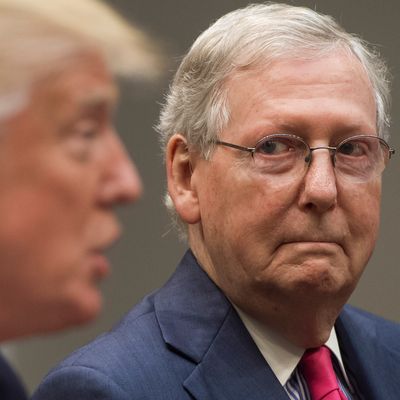
On the 80th anniversary of D-Day, Senate Minority Leader Mitch McConnell took to the op-ed pages of the New York Times to offer some very traditional arguments on the enduring lessons of the fight against totalitarianism in World War II. Here’s a sample:
American soldiers, sailors, airmen and Marines joined allies and took the fight to the Axis powers not as a first instinct, but as a last resort. They ended a war that the free world’s inaction had left them no choice but to fight.
Generations have taken pride in the triumph of the West’s wartime bravery and ingenuity, from the assembly lines to the front lines. We reflect less often on the fact that the world was plunged into war, and millions of innocents died, because European powers and the United States met the rise of a militant authoritarian with appeasement or naïve neglect in the first place.
As you might expect, like most Republicans who came of age during the Cold War, McConnell thinks we are in danger of the same pattern of dangerous indifference to totalitarian threats today. Indeed, though he does not mention the name of the 45th president (probably wise of him since he recently endorsed Trump’s return to the White House), the op-ed can be read as an extended criticism of the America First mentality that is ascendant in his party. He is pretty clearly warning that the isolationists who so often defended Hitler and Mussolini and fought U.S. entry into the war against them are experiencing a comeback in the face of new threats today. And while McConnell makes a pro forma reference to “the American left’s longstanding allergy to military spending,” his real target is MAGA-land: “Some vocal corners of the American right are trying to resurrect the discredited brand of prewar isolationism and deny the basic value of the alliance system that has kept the postwar peace.”
Unfortunately for those who would like to resurrect the post-D-Day FDR-Truman strategy of keeping the peace through a combination of U.S. preparedness, democratic alliances, “soft” power (economic and ideological), and skillful diplomacy, McConnell has his own set of blinders. All he can see is deterrence based on military power. And so even as he bashes Republican isolationists, he carps at Democrats for inadequately arming America to the teeth:
President Biden or congressional Democrats require another major conflict to start investing seriously in American hard power.
The president began this year’s State of the Union with a reference to President Franklin Roosevelt’s 1941 effort to prepare the nation to meet the Axis threat. But until the commander in chief is willing to meaningfully invest in America’s deterrent power, this talk carries little weight.
Let’s see: As of 2023, the U.S. was spending $916 billion per year on national defense, more than twice the amount being spent by China ($296 billion), Russia ($109 billion), Iran ($10 billion), and North Korea ($4 billion) combined. As a percentage of GDP, the United States is spending more today (3.4 percent) than it did in 1999 (2.7 percent), even though we are not at war with anyone. Perhaps the United States is not spending as wisely as it might on national defense, and it certainly could spend more. But the idea that we have failed to “meaningfully invest in America’s deterrent power” is only tenable if you believe conflict around the world is solely determined by the “American hard power” McConnell craves. Would there ever be enough bristling U.S. “military strength” to stop all war? It’s doubtful.
If you think about it, McConnell’s view of peacekeeping differs from Trump only by degree. The 45th president manifestly believes someone exactly like him — or better yet, him exactly — can prevent wars from breaking out via a combination of the “strength” he projects and the military force he could theoretically deploy if he wanted. It reflects Trump’s Jacksonian conviction that potential adversaries must be persuaded that they risk catastrophic violence if they so much as think about threatening America and its interests. It’s the so-called “madman theory” of national defense in the hands of someone who is credibly a madman. There’s no room for — or need of — diplomacy in a world made safer by an America liberated from any principle other than massive retaliation.
For all their differences, McConnell and Trump are devoted to a common vision of “peace through strength.” The Kentuckian thinks it’s mostly about spending adversaries into oblivion by creating a military machine no one can match. The former president likes aggressive defense spending, too — how else can you pay for those military parades he loves? — but believes his own strength is all that matters. Either way, genuine peace achieved by peaceful means is off the table.
More on politics
- Trump Is Threatening to Invade Panama, Take Back Canal
- What Happened to Texas Congresswoman Kay Granger?
- Who Is Lara Trump and What’s With the Quashed Senate Rumors?






























